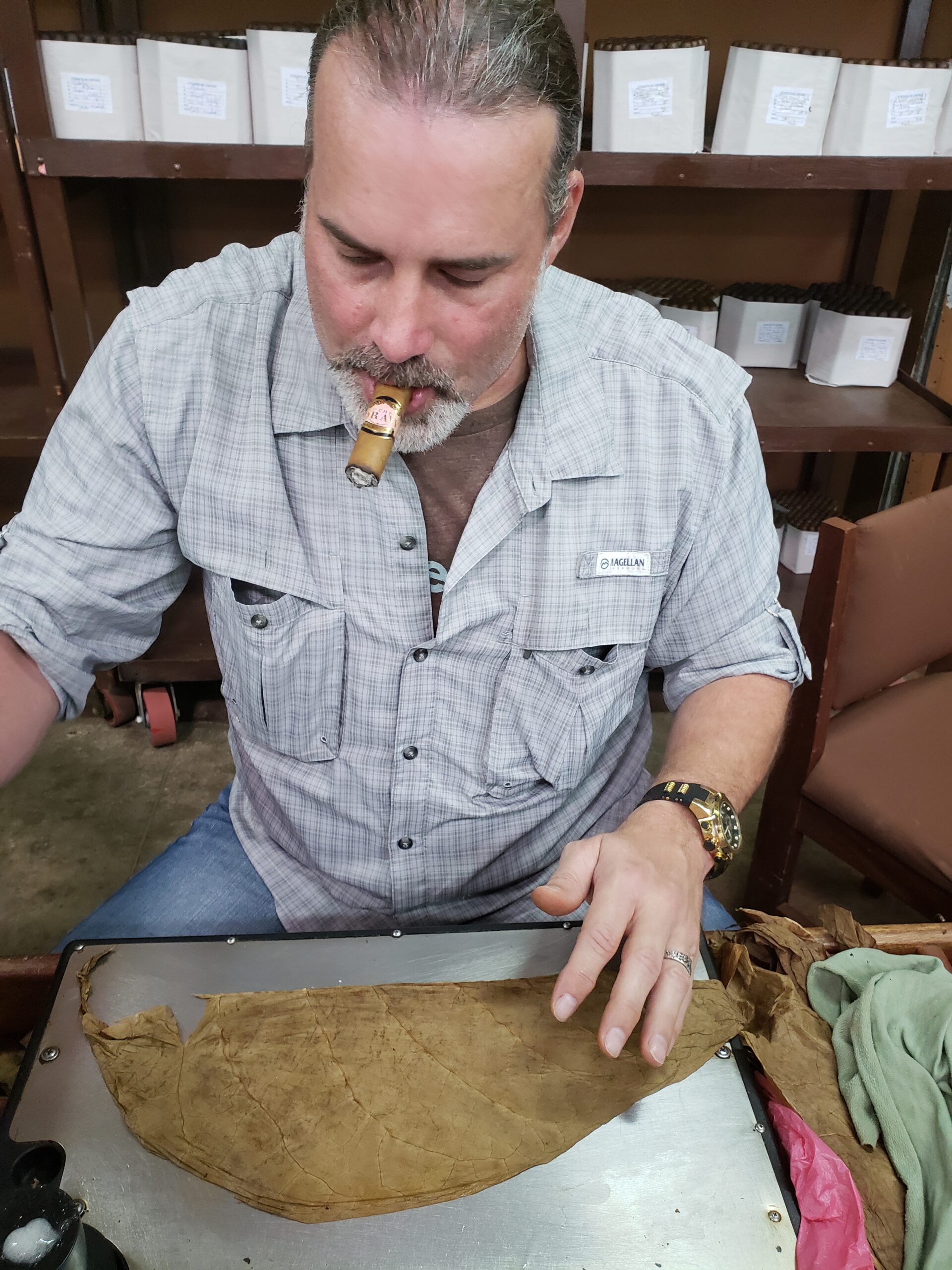
The veteran-owned company is finding ways to give back.
It’s mid-June in North Carolina, and I’ve just arrived at the sprawling JR Cigars store for the Smokin’ in the Carolinas cigar festival. I have an early morning meeting with Robert Holt of Southern Draw Cigars, but I have no idea what he looks like. I make my way through the JR Cigars store and into the lounge where we’ll be meeting. The lounge is crowded, but right away, I spot a person I’m positive must be Holt. His long salt-and-pepper hair is pulled back in a ponytail, he sports a beard and he commands the room. There are a few guys standing in what could be considered a line to talk to him. I join the line.
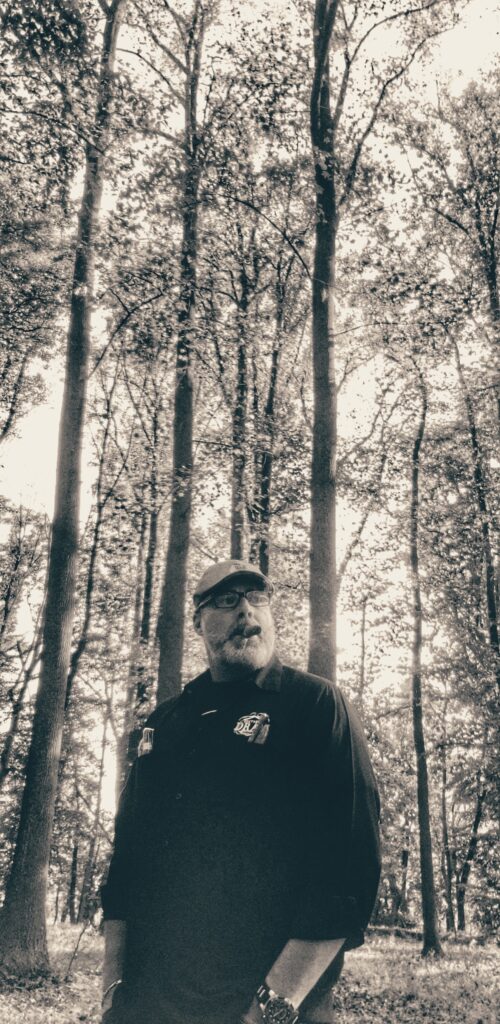
It’s little wonder that Holt is so loved. Southern Draw Cigars are gaining popularity at an incredible speed and are very well-made. Spend even a few minutes on Instagram and you’ll find at least one of your friends posting about a Southern Draw cigar. Not only that, after spending some time talking with Holt, I discover he’s also one of the nicest, most genuine guys in the industry, and he loves what he does.
But Holt wasn’t someone born into the industry or part of a cigar makers dynasty. Rather, he spent a number of years in the Army and 15 years post-Army in corporate America as a radiofrequency engineer, working at a company called PrimeCo, which we now know as Verizon Wireless.
“I was one of the original founders, or what we call ‘pioneers,’ of Verizon,” Holt says. “Doing that took me all around the world, and it’s what expanded my vision and understanding of the tobacco industry, the process of growing tobaccos, of fermenting tobaccos, and of turning them into what we see today: a beautiful piece of art that we get to smoke.”
For Holt and his wife, Sharon, this was a time of great financial success and growth in the wireless industry, but it led to a divisiveness in the family. Holt says that it has always been an agreement in their 23 years of marriage to put their priorities as faith, family, then business. “I had it business, family, then faith,” Holt says.
This mixing of priorities prompted Holt to leave the wireless industry and seek his passion elsewhere, eventually, of course, leading right to cigars. Holt’s initial love for cigars bloomed when he was nearing the end of his military service. His eyes light up as he remembers the very first cigar he had; a La Gloria Cubana Wavell, given to him by a friend who one of his cigars is now named for—the Firethorn.
“When I smoked it, my friend said: ‘We’ve been through a lot. We’ve seen death. We’ve seen life. We’ve seen lives changed. We’ve seen lives lost. But I tell you what, when people are happy and excited and they’re celebrating, they smoke and they drink. And when they’re down and depressed and they’ve seen it all, and the world is coming to an end, they smoke and they drink. So, you can never be wrong with lighting up a cigar because it’s always right for the mood.’
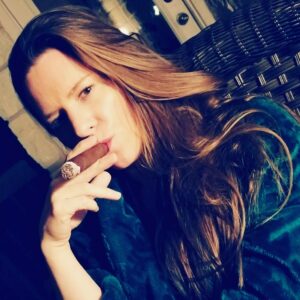
“And I said: ‘You know what? I will smoke a cigar every day of my life for that reason.’ Because it doesn’t matter how high or how low, a cigar is always perfect, no matter what.”
From the very beginning of the now 5-year-old Southern Draw Cigars, Robert and Sharon have wanted to make sure that their company was always focused on people: the family and friends who got them to this point, his fellow veterans, and the hundreds of people who make their cigars.
“What really makes us different is that we’re mission-oriented,” Holt says. “We realized something early on: We work for the people of Nicaragua. We work for the people who produce our tobacco, the people who work hard every day in the fields and in the factories and in the barns. As long as we have a mission and a charity behind all that we do, it makes us different.”
The name Southern Draw stems from this mission mindset. The name conjures up feelings of hospitality, faith and family, with a little bit of the science of what makes a good and consistent cigar thrown in. Put it all together, Holt says, and you have Southern Draw.
Holt believes the cigar industry should always be about unity, charity and service to other people. And for Holt, this has translated into making cigars where portions of the proceeds go to causes and charities.
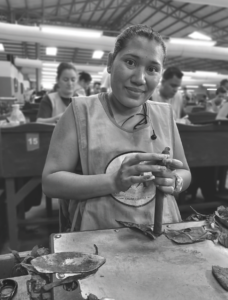
“What we do matters, and it makes a difference, not just to ourselves but to communities around the world,” Holt says. “This industry is about spending time with people and having a cigar. It changes lives. It truly does.”
One of these charitable cigars, Ignite, is part of an annual series where each year the proceeds of the cigar go to a different military charity. For 2019, Ignite’s proceeds will benefit the Navy Seal Foundation (last year’s cigar benefited Cigars for Warriors). Holt explains that the beauty of the Ignite project is bringing awareness to a foundation that helps military families transition out of service and back into civilian life. And Holt says this series will continue for as long as they are making cigars.
Holt hammers home multiple times the importance of charity within the cigar industry, even when it can hurt the bottom line.
“We don’t have a lot, and we’re not wealthy people,” Holt says. “When we give something, it’s literally taking food off the table, which is OK. My wife has sunk this into my head over the years: ‘Give of your first and give your best.’ We don’t want to be that brand where at the end of the year if we have something left, we’ll give. We want to give throughout the year. We want to struggle with them.”
Another way Holt likes to acknowledge those who have helped him along the way is to name cigars after people who have “put themselves second or third” to make sure that Holt was successful and taken care of.
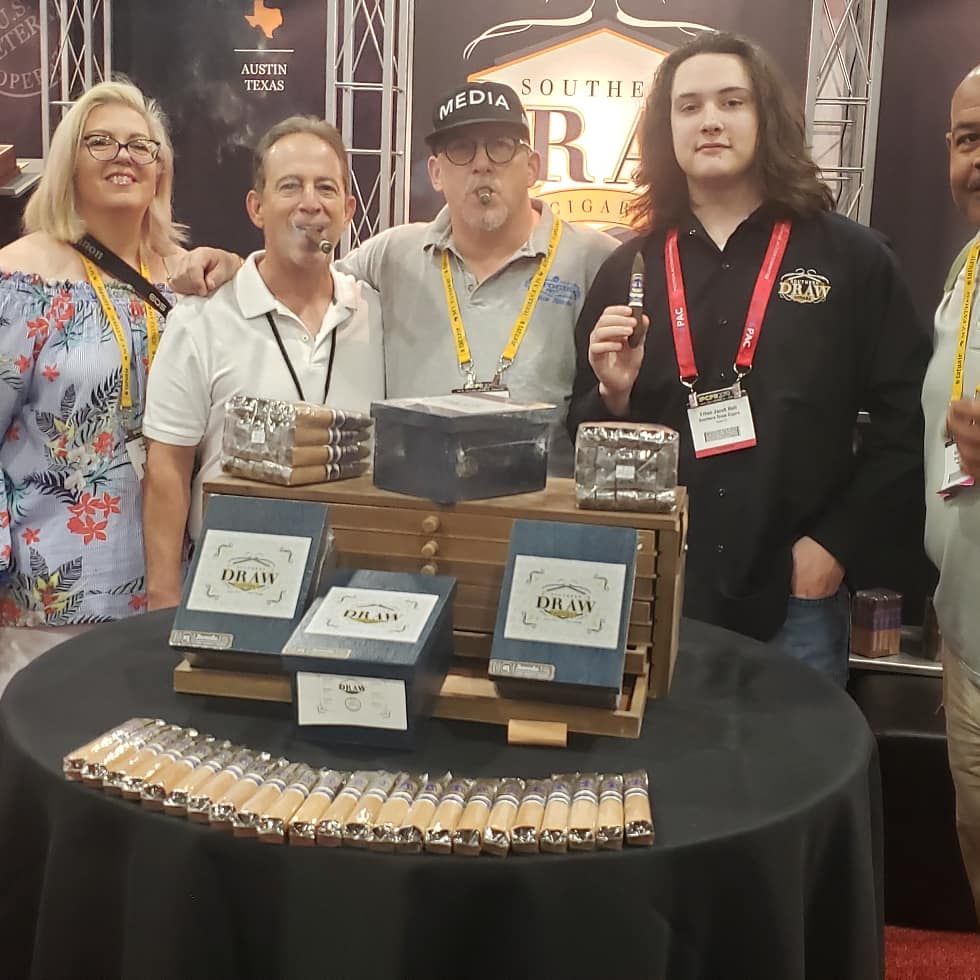
“The blends characterize who they are and what they are; their soul, their characteristics, their personalities are in those blends,” Holt says. “Each blend is very carefully thought out, very carefully marketed and, ultimately, if people know them and they smoke their cigar, they say, ‘We get it. We get it.’
When asked if Holt will ever name a cigar after himself he replies, “Absolutely not.”
“I don’t impress myself that much,” Holt explains. “I don’t have that personality; they do, and they’ve demonstrated it. My son Ethan Jacob is only 18 [the Jacob’s Ladder cigar is named after him], and I tell you, he has the wisdom of someone twice his age.”
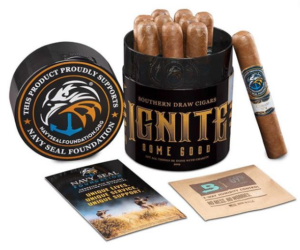
Owning your own cigar company isn’t all giving back and naming cigars, there are many challenges and Southern Draw is no exception. Holt says the biggest challenge is to have consistent cigars when sourcing the raw materials and ensuring that each step of the process remains the same for every single stick.
Holt says that Southern Draw has grown 130–140 percent every year since they’ve been in business, but they’re still borrowing from family and friends so they can continue growing. And that’s been a huge challenge, one that Holt says keeps him up at night smoking on his patio.
“Erik Espinosa told me early on: ‘Brother, you’re never going to make money in this business. You’ve got to do it for the passion.’ And I thought, don’t tell my family that,” Holt says laughing.
Despite the challenges, and the ups and downs, Holt says the biggest rewards are seeing the workers at the AJ Fernandez factory (where his cigars are made) taken care of, getting to sit in cigar lounges with veterans and their families, and enjoying a cigar and good conversation.
“What I enjoy most is the opportunity to have a conversation and learn about people,” Holt says. “It helps us appreciate who we are and what we are doing, and it verifies that two chairs, cigars and an ashtray will change a life if you allow it to.”
For more information about Southern Draw Cigars, visit southerndrawcigars.com.
Other Veteran-based Cigar Companies
Cigars for Warriors
This nonprofit takes cigar donations from both companies and individuals and sends them to service members in combat zones. Sending these cigars is their way of honoring, showing respect and thanking those who serve our country. cigarsforwarriors.org.
Warfighter Tobacco
Warfighter was founded by Chris Ferdico and Scott Jansen, both veterans of the 101st Airborne Division. The company is called Warfighter as an homage to service members, veterans, firefighters, police officers, first responders and “anyone who believes in selflessly protecting others from the cold, hard world.”
“Warfighting is tough work,” their website states, “and throughout history, at the end of the mission, when one of our members goes down, or it is time to celebrate victory, the warfighter has done so with a cigar in hand. It is in that spirit that Warfighter Tobacco Company was born.” warfightertobacco.com.
